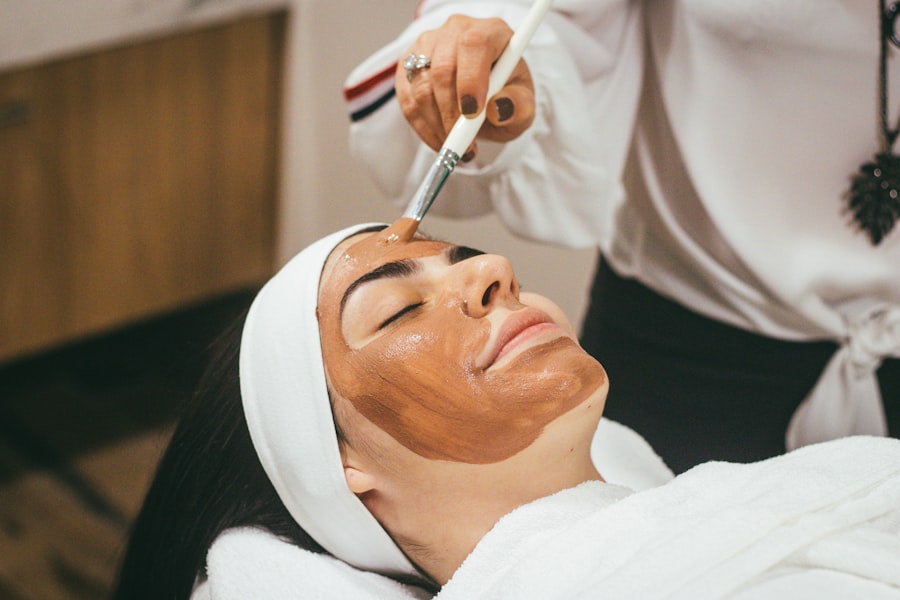Facial hair removal for black skin comes with its own set of challenges due to the unique characteristics of melanin-rich skin. One of the main challenges is the potential for hyperpigmentation, which is the darkening of the skin in response to irritation or trauma. This means that traditional hair removal methods such as waxing, threading, and shaving can lead to dark spots and uneven skin tone if not done carefully. Additionally, black skin tends to be more prone to ingrown hairs, which can cause discomfort and lead to scarring if not properly managed. The coiled nature of black hair also makes it more likely to curl back into the skin after removal, increasing the risk of ingrown hairs. Understanding these challenges is crucial for finding the most effective and safe methods for facial hair removal on black skin.
Furthermore, black skin is more sensitive and can be more reactive to certain hair removal techniques. The use of harsh chemicals or abrasive exfoliation methods can lead to irritation and inflammation, exacerbating existing skin concerns. It’s important to approach facial hair removal for black skin with a deep understanding of these unique challenges in order to minimize the risk of adverse effects and achieve smooth, healthy skin.
Key Takeaways
- Facial hair removal for black skin comes with unique challenges such as hyperpigmentation and keloid scarring.
- The right method for facial hair removal on black skin includes options like shaving, depilatory creams, and laser treatments.
- Preparing the skin for effective facial hair removal involves gentle exfoliation and moisturizing to prevent irritation.
- To minimize irritation and ingrown hairs, it’s important to use sharp, clean razors and avoid shaving too closely.
- Aftercare for smooth and healthy skin on black skin includes using gentle products and moisturizing regularly.
Choosing the Right Method for Facial Hair Removal on Black Skin
When it comes to choosing the right method for facial hair removal on black skin, it’s essential to consider the potential impact on the skin’s health and appearance. Traditional methods such as waxing and threading can be effective for removing facial hair, but they also carry a higher risk of causing hyperpigmentation and ingrown hairs on black skin. Shaving, on the other hand, can lead to razor bumps and ingrown hairs if not done carefully. Therefore, it’s important to explore alternative methods that are gentler on black skin while still delivering effective results.
One such method is laser hair removal, which targets the hair follicles with concentrated light energy to inhibit future hair growth. This method is particularly effective for black skin because it can selectively target the hair without causing damage to the surrounding skin. However, it’s crucial to seek out a provider with experience in treating black skin to minimize the risk of hyperpigmentation. Another option is depilatory creams specifically formulated for sensitive skin, which can effectively dissolve the hair at the surface without causing irritation. Ultimately, choosing the right method for facial hair removal on black skin requires careful consideration of the potential impact on the skin’s health and appearance.
Preparing the Skin for Effective Facial Hair Removal
Preparing the skin for effective facial hair removal on black skin is essential for minimizing the risk of irritation and complications. One important step is to cleanse the skin thoroughly to remove any dirt, oil, and debris that could interfere with the hair removal process. Using a gentle cleanser formulated for sensitive skin can help maintain the skin’s natural moisture barrier and reduce the risk of irritation. Additionally, exfoliating the skin with a mild scrub or chemical exfoliant can help prevent ingrown hairs by removing dead skin cells that can trap hair beneath the surface.
Another crucial aspect of preparing the skin for effective facial hair removal is ensuring that the hair is at the right length for the chosen method. For shaving, it’s best to soften the hair with warm water and a pre-shave oil to make it easier to remove without causing irritation. For laser hair removal, it’s important to avoid plucking or waxing the hair beforehand, as this can interfere with the treatment process. By taking the time to properly prepare the skin and hair for facial hair removal, individuals with black skin can minimize the risk of adverse effects and achieve smoother, healthier-looking skin.
Tips for Minimizing Irritation and Ingrown Hairs
| Tip | Description |
|---|---|
| Exfoliate regularly | Gently exfoliate the skin to remove dead cells and prevent ingrown hairs. |
| Use a sharp razor | Replace your razor regularly to avoid irritation and ingrown hairs. |
| Shave in the direction of hair growth | Shaving against the grain can lead to irritation and ingrown hairs. |
| Moisturize after shaving | Apply a soothing moisturizer to calm the skin and reduce irritation. |
| Avoid tight clothing | Wearing tight clothing can cause friction and lead to ingrown hairs. |
Minimizing irritation and ingrown hairs is a top priority when it comes to facial hair removal on black skin. One effective way to achieve this is by using a sharp, clean razor when shaving to reduce the risk of razor bumps and ingrown hairs. It’s also important to shave in the direction of hair growth and avoid going over the same area multiple times to minimize irritation. Additionally, using a soothing aftershave product formulated for sensitive skin can help calm any inflammation and reduce the risk of ingrown hairs.
For those considering laser hair removal, it’s important to protect the skin from sun exposure before and after treatment to minimize the risk of hyperpigmentation. Wearing sunscreen with a high SPF and avoiding prolonged sun exposure can help maintain an even skin tone and reduce the risk of post-treatment complications. Furthermore, individuals with black skin should be cautious when using chemical depilatory creams, as these products can be harsh and may cause irritation if left on the skin for too long. By following these tips for minimizing irritation and ingrown hairs, individuals with black skin can achieve smooth, healthy-looking skin after facial hair removal.
Aftercare for Smooth and Healthy Skin
Aftercare is an essential part of achieving smooth and healthy skin following facial hair removal on black skin. One important aspect of aftercare is moisturizing the skin regularly to maintain its natural moisture barrier and prevent dryness and irritation. Using a gentle, fragrance-free moisturizer formulated for sensitive skin can help soothe any post-treatment inflammation and keep the skin looking and feeling its best. Additionally, applying a soothing gel or cream containing ingredients like aloe vera or chamomile can help calm any redness or discomfort after facial hair removal.
Another crucial aspect of aftercare for smooth and healthy skin is avoiding harsh exfoliation and abrasive skincare products that can further irritate the skin. Instead, opting for gentle exfoliation with a soft washcloth or mild exfoliating scrub can help prevent ingrown hairs without causing additional irritation. It’s also important to protect the skin from sun exposure by wearing sunscreen with a high SPF and seeking shade during peak sun hours. By prioritizing aftercare for smooth and healthy skin, individuals with black skin can minimize the risk of post-treatment complications and maintain a clear, even complexion.
Professional Options for Facial Hair Removal on Black Skin

For those seeking professional options for facial hair removal on black skin, there are several effective treatments available that cater to the unique needs of melanin-rich skin. Laser hair removal is a popular choice for individuals with black skin because it can effectively target coarse, dark hair without causing damage to the surrounding skin. However, it’s crucial to seek out a provider with experience in treating black skin to minimize the risk of hyperpigmentation and achieve optimal results. Additionally, electrolysis is another professional option for facial hair removal that can be effective for all skin types, including black skin.
Another professional option for facial hair removal on black skin is dermaplaning, which involves using a surgical scalpel to gently exfoliate the outer layer of dead skin cells and remove fine vellus hair (peach fuzz). This treatment can help improve the texture and tone of the skin while also facilitating smoother makeup application. However, it’s important to seek out a licensed professional with experience in treating black skin to ensure safe and effective results. By exploring professional options for facial hair removal on black skin, individuals can achieve long-lasting results with minimal risk of adverse effects.
Embracing and Celebrating Natural Facial Hair on Black Skin
While there are many effective methods for facial hair removal on black skin, it’s also important to embrace and celebrate natural facial hair as a beautiful and integral part of black identity. The natural texture and pattern of black hair are unique and diverse, reflecting a rich cultural heritage that should be honored and celebrated. Embracing natural facial hair on black skin means challenging societal beauty standards that often prioritize Eurocentric ideals of smooth, hairless skin.
Furthermore, embracing natural facial hair on black skin involves promoting self-acceptance and self-love by celebrating individual beauty in all its forms. This includes recognizing that facial hair is a normal and natural part of many people’s appearance, regardless of gender or cultural background. By embracing and celebrating natural facial hair on black skin, individuals can foster a sense of empowerment and confidence in their own unique beauty while challenging narrow beauty standards that fail to recognize diverse forms of beauty.
When it comes to facial hair removal for black skin, it’s important to consider the best methods for your specific skin type. In a related article on inlaserhairremoval.com, they discuss the importance of caring for your face after laser hair removal, providing valuable tips and insights for maintaining healthy, smooth skin post-treatment. This article offers helpful advice for those seeking effective and safe hair removal solutions tailored to their unique needs. Check out the full article here.
FAQs
What are the common methods for facial hair removal for black skin?
Some common methods for facial hair removal for black skin include shaving, waxing, threading, depilatory creams, and laser hair removal.
Is laser hair removal safe for black skin?
Yes, laser hair removal can be safe for black skin when performed by a trained professional using the appropriate equipment for darker skin tones.
Are there any specific considerations for facial hair removal for black skin?
Yes, individuals with black skin should be cautious when using certain hair removal methods, as they may be more prone to developing ingrown hairs and hyperpigmentation.
What are the potential risks of facial hair removal for black skin?
Potential risks of facial hair removal for black skin include ingrown hairs, razor bumps, and hyperpigmentation, especially if the methods used are not suitable for darker skin tones.
Are there specific products designed for facial hair removal for black skin?
Yes, there are specific products and treatments designed for facial hair removal for black skin, such as depilatory creams and laser hair removal devices that are safe for darker skin tones.





